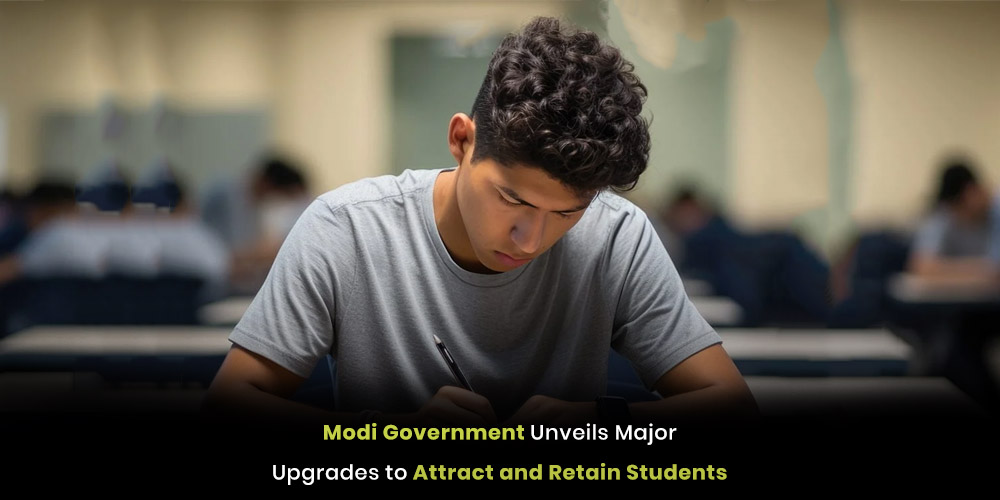Indian Education Gets a Boost: Modi Government Announces Scholarships, Infrastructure Investments.
Good News for Students: Modi Government Invests in Indian Education with New Funding and Programs
The Modi administration has introduced several programs geared at encouraging local education in a calculated attempt to strengthen India's education industry and increase its appeal to foreign investors. This initiative not only demonstrates the nation's dedication to bolstering its educational system, but it also presents compelling benefits for students choosing Indian universities over international ones. The budget that Finance Minister Nirmala Sitharaman unveiled on July 23 was a mixed bag for the education sector in India. Alongside financial increases for certain areas, there were also significant setbacks for others. Several significant increases have been announced, including an extension of the PM Poshan scheme and government support for student loans up to Rs 10 lakh for postsecondary education at Indian universities. Other areas are facing budget cuts in the interim.
The government intends to modernize 1,000 Industrial Training Institutes (ITIs) to make sure that the programs they offer meet the needs of the labor market. Furthermore, one crore youth are to receive internships through a new initiative. A one-time assistance payment of Rs 6,000 along with a stipend of Rs 5,000 would be given to interns. The initiative's expenses will be paid for by businesses using their corporate social responsibility (CSR) money. More than Rs 800 crore was added to the PM Poshan scheme which has led a change from Rs 11,600 crore in 2023–2024 to Rs 12,467.4 crore in 2024–2025. With this increase, school children's nutritional support will be improved, protecting their health and wellbeing.
The Center has been allocated a total of Rs 1.5 lakh crore for education, employment, and skill development. This covers funding for efforts aimed at skill development, digital learning, and student loans. The government would grant one lakh students e-vouchers with a 3% interest subsidy per year, along with loans up to Rs 10 lakh for further study at domestic institutions.
Students will pay less for their loans overall thanks to the 3% interest subsidy, which will lower their long-term financial burden and increase the affordability of higher education. As per TOI, Prof. Manojranjan Nayak, the founder president of Siksha 'O' Anusandhan, Odisha, stated that "this initiative will potentially improve the quality and reputation of local universities and colleges as well as encourage students to study in Indian institutions."
The provision for grants to central universities increased significantly by more than Rs 4,000 crore, reaching Rs 15,928 crore in 2024–25. The Finance Minister also announced the opening of a new medical college in Bihar, which will improve the infrastructure for healthcare education in the area. Artificial intelligence (AI) and digital learning also attracted a lot of interest. With an increase in funding from Rs 35 crore to Rs 255 crore, the government is demonstrating its commitment to promoting technology-driven education. The amount of money allocated to student help for higher education increased by Rs 493 crore, from Rs 1,320 crore to Rs 1,813.2 crore. Additionally, financing for apprenticeships, innovation, and research was given top priority. From Rs 193.4 crore to Rs 355 crore, research funding grew by Rs 162 crore. There was an increase in the National Apprenticeship Training Scheme from Rs 460 crore to Rs 600 crore. In contrast, the revised forecast for 2023–24 witnessed a loss of Rs 9,090.4 crore in the education budget. As a result, the funding for 2024–2025 was reduced to Rs 1,20,627.8 crore. Even though the budget projection for the previous year increased by 6.8%, the revised statistics show a decrease.
Editor’s Note:
The aggressive strategy taken by the Modi administration to revitalize local education is expected to fundamentally aid the Indian educational system. The government is not only meeting the urgent requirements of students by creating a climate that allows local institutions to compete on a global scale, but it is also laying the groundwork for future innovation and expansion in the education industry. Students, instructors, and institutions will all be closely observing these rules as they take shape to see how these changes play out. For the time being, students who choose India over other nations can rest easy knowing that they have a more promising and competitive future in terms of education.
Skoobuzz applauds the step of the government for emphasis on skill development and employability and also ensures that graduates are well-equipped to meet the demands of the modern job market.














0 Comments (Please Login To Continue)